book at best price
Start
here.
here.

14.07.2020
A unique festival program was planned for a unique event. 100 years of the Salzburg Festival - this celebration was to be celebrated as befits the picturesque baroque and cultural city of Salzburg.
Once again Salzburg would have been a unique world stage for artists, visitors, locals and culture lovers (C celebrities and day trippers anyway), but the prevailing pandemic in 2020 has put a brake on cultural life all over the world. "Sent for me?" The well-known exclamation of the "Everyman", when he realizes that death is practically behind him to come and get him - gets a new meaning in times of Corona, one might think.
The Salzburg Festival has been playing high stakes since March 2020, and it seems to have won: The anniversary festival (which I personally have already longed for like winning the lottery) is taking place. But differently than planned. Smaller. More controlled. With security concept. With 1180 seats at the Domplatz at the "Jedermann" performance instead of 2400.
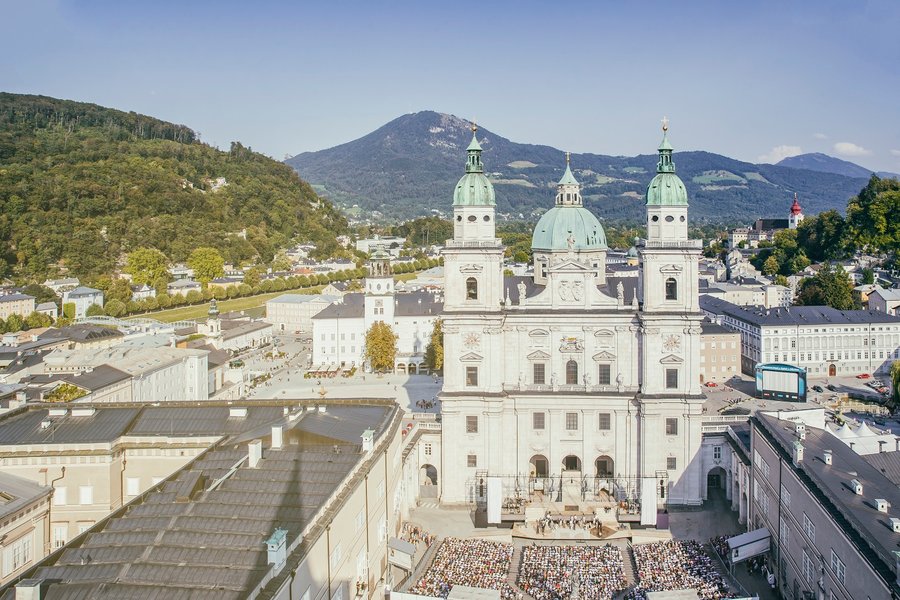 "Jedermann" Location Domplatz (© SF/Neumayr/Leo)
"Jedermann" Location Domplatz (© SF/Neumayr/Leo)
Back then 100 years ago - at the very first "Jedermann" at the Salzburg Cathedral Square on August 22nd, 1920 - Austria was in a tormenting famine, so shortly after the war. But Max Reinhardt was nevertheless convinced that art and culture were as important to us humans at all times just like a bite of bread. He wanted opera and drama and the best of both that existed in 1920 - he wanted the ultimate ensemble, the best "Everyman" of that time Alexander Moissi, proximity to the people and the cathedral square - despite all the post-war worries.
The anniversary festival 2020 makes the founding ideas of Max Reinhardt, Hugo von Hofmannsthal and Richard Strauss seem more topical than ever: Art as food and meaning of life in times of Corona. With a prevention concept, expert advisory board and safety precautions with a general obligation to wear masks. Without hospitality, but with more distance. On the anniversary day of the first performance of "Everyman" 100 years ago under Max Reinhardt, a reading by Everyman performers Klaus Maria Brandauer, Peter Simonischek, Tobias Moretti, Cornelius Obonya and Philipp Hochmair will be celebrated throughout the city: A who is who of the best German-speaking male actors who have held this role in recent decades - an award almost as important as the Iffland Ring for the best living actor of German tongue.
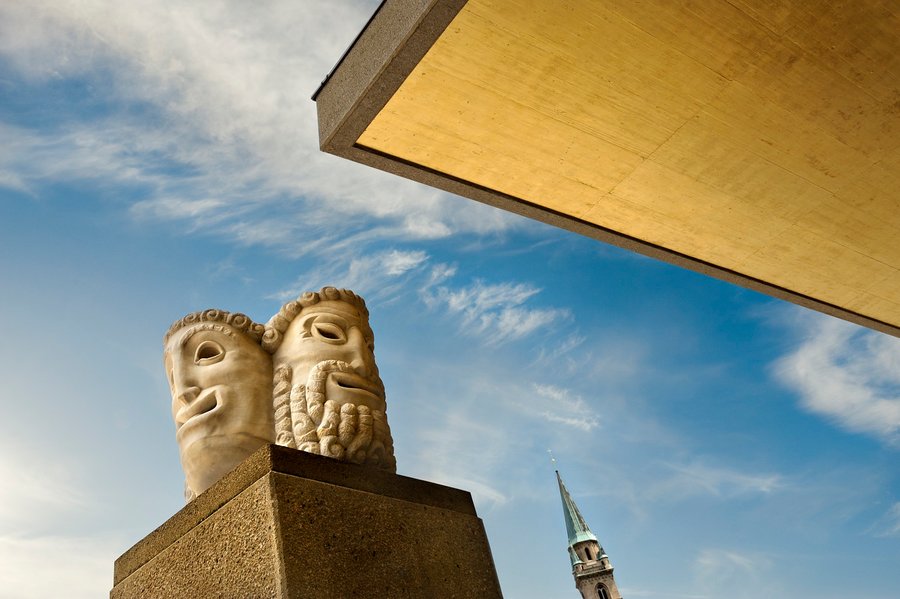 Masks in front of the festival theatre (© Luigi Caputo)
Masks in front of the festival theatre (© Luigi Caputo)
On August 22nd, 1920 the post-war Salzburg was not so busy. As late as July the innkeepers had complained about too little turnover and visitors (What a parallel!), now in August there was no mousehole left, if one can believe the reports in the local newspapers at the time. With the archbishop's blessing, Max Reinhardt had brought his "Jedermann", which he had already successfully staged throughout Europe - even then in the most unusual locations - to Salzburg directly on the cathedral square: The world-famous director and theatre man was never satisfied with small fish - his parties, receptions and travelling theatre in his lavishly decorated Leopoldskron Palace bear witness to this, as do his productions in Salzburg City.
 Schloss Leopolskron and Hohensalzburg Fortress
Schloss Leopolskron and Hohensalzburg Fortress
How can one imagine the first "Everyman" performance at the Cathedral Square in 1920? First things first - then and now: the weather.
"After a gloomy day, a clear sky overhung the city" – that’s what the newspaper "Neue Freie Presse" wrote about the early evening of the premiere. The special correspondents of the "Neue Freie Presse" and the "Neue Wiener Tagblatt" are impressed by the location, the Reinhardt Ensemble, the play. Church bells, the Jedermann’s calls and the doves that fly up at the right moment - everything seems to be perfectly staged – but with Reinhardt there are no coincidences. With this theatre in front of a cathedral, the audience had a lot of respect, it seems. It's good that the archbishop was also present at the premiere, and he even was very moved - according to what I heard.
Thus the "Neue Freie Presse" cabled to Vienna in a night telegram after the premiere in 1920, "A select audience followed the stage procedure with emotion, but with respect to the almost worshipful mood that hovered over the production and communicated itself to the audience, suppressed the applause that swells at the end. Reinhardt, who hardly ever had a greater success, was praised but not called out."
And the "Neue Wiener Tagblatt" also reported in its edition from August 23rd, "The consecration of the place forbade profane applause. Full of what they had seen and heard, the audience left the cathedral square slowly and quietly, deeply moved, and soon the shadows of the evening descended upon it!"
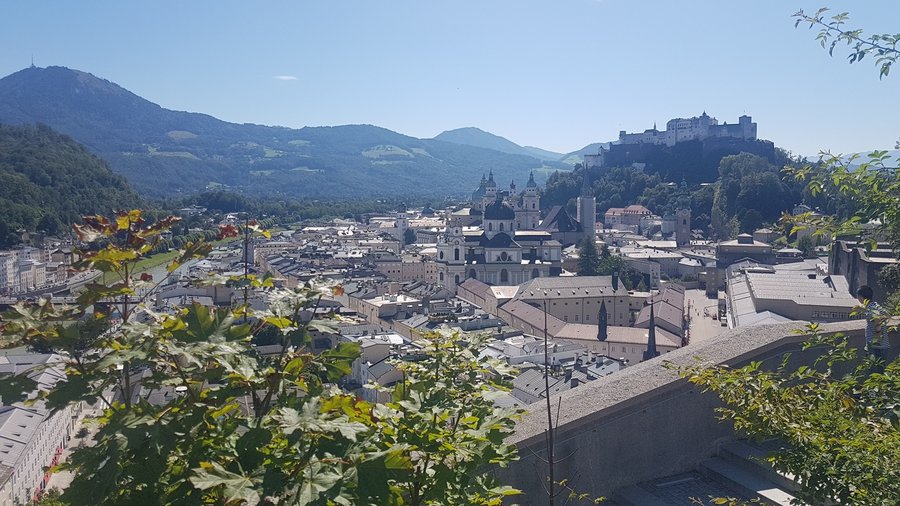 View of Salzburg from Mönchsberg
View of Salzburg from Mönchsberg
In the 1930s, the mood became more relaxed for a short time despite the solemnity of the place: while in nearby Munich the political mood was already quite different, in Salzburg, for example, the 1933 Summer Festival (still) took place and the flair with the many artists present could still be enjoyed. Even Stefan Zweig, for once, descends from the Kapuzinerberg to visit Frida Richard for an artist's tea (she is the mother of "Everyman" until 1937 and again in 1946) (but he avoids invitations to Reinhardt in Leopoldskron) - of course: his books, too, were "handed over to the flames" at the book burnings in Germany two months earlier - a year later he will have emigrated to England. The calm before the unbelievable storm.
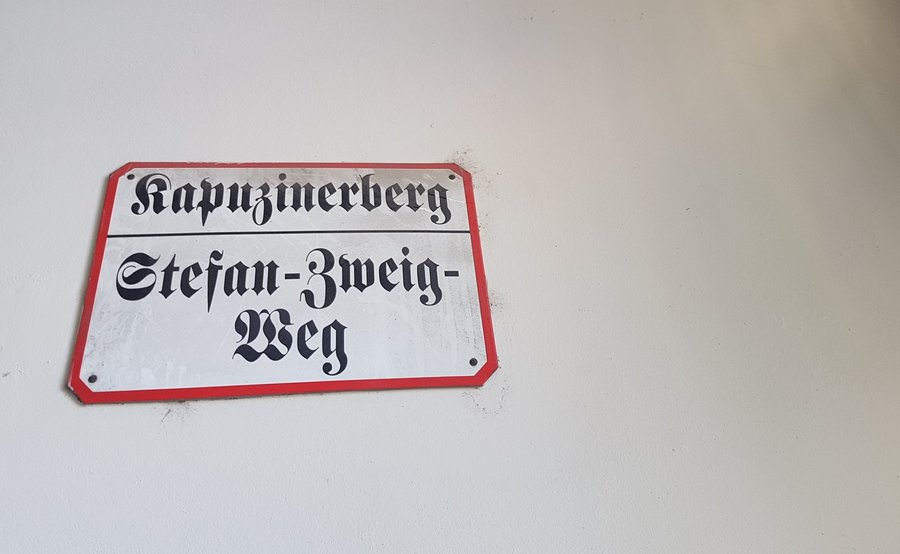 Stefan Zweig lived in the little castle on Kapuzinerberg
Stefan Zweig lived in the little castle on Kapuzinerberg
1937 - another flare-up of high culture - Toscanini, Bruno Walter are still conducting and Max Reinhardt is staging - but the name of the director is already removed from the last posters - one year later, after Hitler's invasion, most of this century's artists are already in exile, on the run or hiding, new names can be found on the theatre bills: Quite a few of them are still world-famous today and have to face more or less strict denazification procedures since 1946. After the Second World War, it was important to the American occupying powers that Austria quickly regained its (cultural) identity, and the Salzburg Festival was to help them do so. As U.S. Commissioner for Theatre and Music, and thus also for the Festival, Ernst Lothar returns to Salzburg - before the war a highly sought-after director at the Burgtheater and director of the Theater in der Josefstadt - sometimes even together with Max Reinhardt. In Reinhardt's spirit, he will oversee the "Jedermann" productions of the 1950s - a tightrope walk as an Austrian Jewish cultural worker, expellee and American officer.
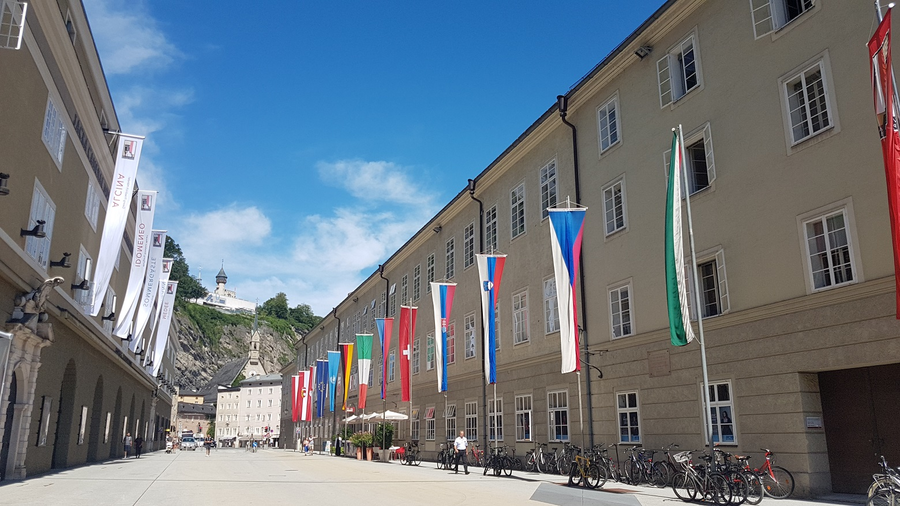 Festival theatres on Max Reinhardt Square
Festival theatres on Max Reinhardt Square
The fact that in Salzburg stage and everyday life, drama and reality in summer merge so wonderfully with each other and that everyone can feel part of the great world theatre, that has probably always been the case. The first "Everyman" Alexander Moissi sits unrecognized in the audience during his performance, Paula Wessely (first as "Gretchen", then as "Glaube" at the festival) cycles through Salzburg and later rides in a convertible at the side of her personal "Everyman" Attila Hörbiger, in the Restaurant Goldener Hirsch actors in the 1960s celebrate all night long, today’s artists sit side by side with us theatre guests at the inn Krimpelstätter or tap the premiere beer barrel at the Stiegl. At breakfast, it is not uncommon to sit in the Café Bazar next to Peter Lohmeyer, who in the evening shuffles through the city to the cathedral square disguised as Death. Gregor Bloeb, after completing the Devil's Roll, curls across the Kajetanerplatz in a camper van, and after the performance half of the Jedermann staff cycle through the city - the city of Salzburg is the most beautiful stage you can imagine.
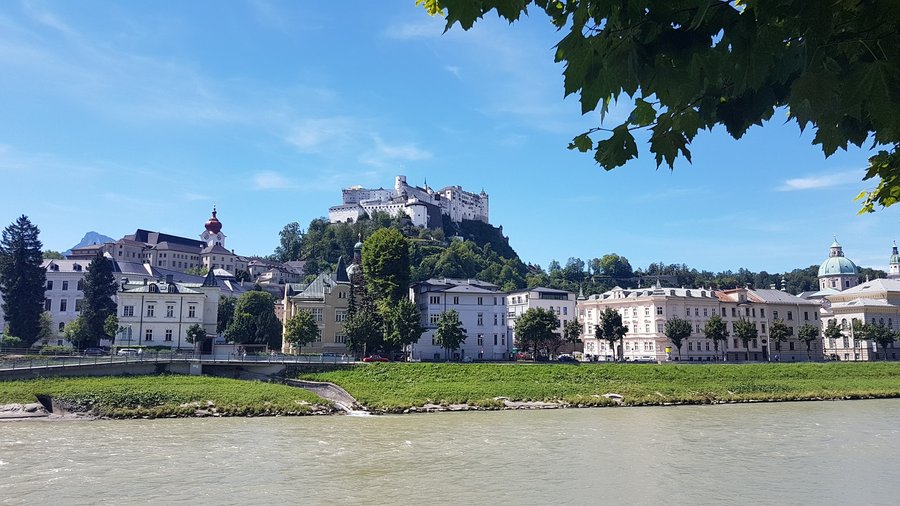 View of Salzburg from the bike trail
View of Salzburg from the bike trail
As a theatre visitor, you feel like you're in the middle of a performance all day long, even if the "Jedermann" doesn't officially start until 5 pm - not infrequently a "Bikram Jedermann", because the afternoon heat on the Domplatz often pushes the actors to their physical limits. This will not be different this year at the anniversary plays. Like all the years before, the dress (or perhaps a daring trouser suit like last year?) of the new Buhlschaft Caroline Peters will be the topic of discussion and after the premiere "Jedermann" Tobias Moretti will tap a barrel of beer for media attention.
And we will survive this year's Corona-mask duty for the audience. Just as the whole affair this year holds a "rollercoaster of emotions" for all involved, as the commercial director puts it.
But that will not have been any different with Max Reinhardt and his ensemble at the very first Salzburg Festival in 1920.
With no less than 110 performances of opera, drama and concerts as well as readings in 30 days in August at 8 instead of 16 venues, the 2020 Salzburg Festival is still more than impressive - but the time frame for the anniversary festivities has been extended: the anniversary program does not end until August 31, 2021. And that in turn makes me almost as happy as winning the lottery.
Bilder im Artikel: © Angelika Mandler-Saul
| hotels: | Hotel Altstadt, Hotel Salzburg Messe, Hotel Europa Salzburg |